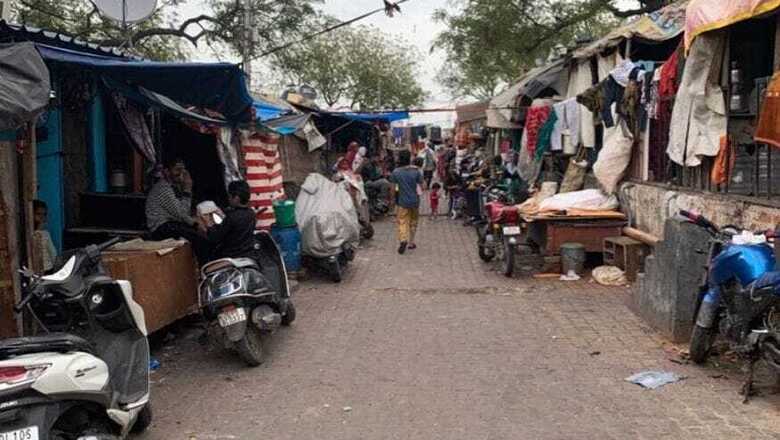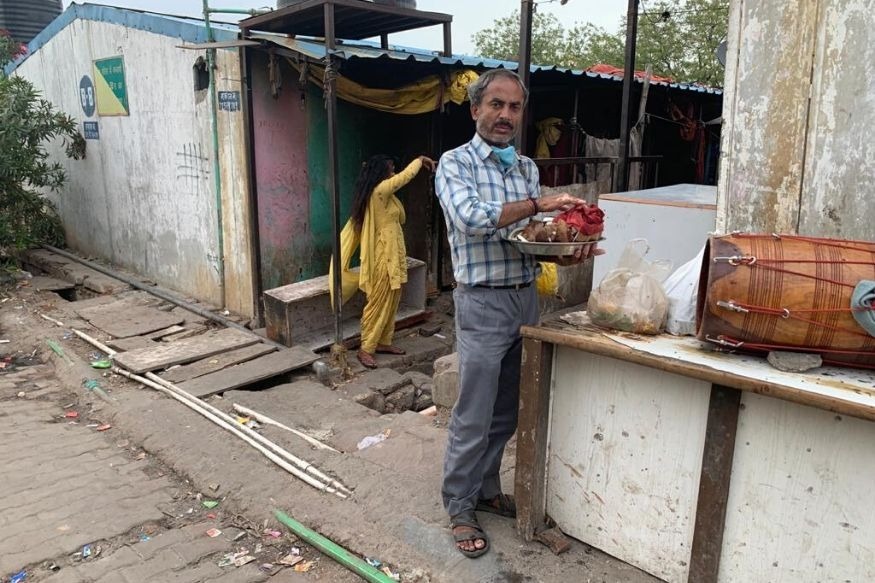
views
New Delhi: Ever wondered what happened to those child performers at Delhi's traffic signals after the Covid-19 lockdown? The ones who doubled up their bodies and wiggled through hoops for small change? Or those street magicians, beggars, ragpickers, snake charmers, bioscope players who amused you in passing? There’s a great likelihood that many of them were people of Kathputli Colony. People who since the announcement of the national lockdown on March 24 have been struggling for food.
According to Vijay Maitri, a theatre artiste, who was born in Kathputli Colony and has been running a crowdfunding campaign to provide food to his people, around 700 of the 2,800 families here are on the verge of starvation.
“We have a lot of people — beggars, widows, rickshaw-pullers, ragpickers, people suffering from leprosy - who sustained themselves somehow till now. They ate at night from whatever they earned during the day. But each day of lockdown is pushing them towards starvation. And then this changing weather - when it's really cold at night due to rains and hot during the day - is making them prone to various illnesses,” Maitri says.
He and many veteran artistes of the colony are focusing their energies into providing food for those 700 families first. “Then, eventually, we are all going to need the support of our patrons, of the public at large,” Maitri says. Close to 150 people have responded to his recently launched crowdfunding campaign. But that may not be enough.
There are folk artistes here, drum players, singers, puppeteers, artisans, for whom the period from April to July every year was when they got most of their bookings at various cultural festivals and private functions. The money they earned during that time is what sustained them for the rest of the year. After the lockdown, their patrons have been cancelling all the shows, leaving the artistes here with a very bleak future.
“Because we have lost these four months, all the planning for the rest of our year has gone haywire. We are in a big mess now. When we used to go out and perform outside, we were given at least one meal. For the past one week now we’ve been sitting at home having three meals everyday, that’s food we are not earning,” says Puran Bhaat, a puppeteer who was awarded the President’s Medal for his contribution to culture in 2003.
“We don’t want money,” Bhaat says with folded hands. “Whoever wishes well for us, we’re asking them to buy us dry rations so that people can prepare their meals however they want to. This is a fight for the survival of Kathputli Colony.”

A group of puppeteers had settled in Kathputli Colony some 60 years ago and later it became a watering hole for street artists.
It’s curious thing that Kathputli Colony, described in Salman Rushdie’s Midnight’s Children, as the “conjurers’ slum”, the place where the “greatest fakirs and prestidigitators and illusionists in the land continuously flocked”, actually no longer exists.
That place was where, some 60 years ago, a group of puppeteers had settled. Over time, it became a watering hole for street performers and artistes across the country. However, in 2013-14 a private builder got into an agreement with them and government agency Delhi Development Authority (DDA) to build a high-rise on their colony. People from the locality were moved a few kilometres away to a transit camp at Anand Parbat where to this day they live.
The transit camp, which covers an entire hill, is home to roughly 14,000 people. As Vijay Maitri takes us around the camp — where live people from 12 states and performers of 22 different types of folk art — he gets surrounded by anxious faces everywhere.
“Why don’t you give food to us? Why are you only getting food for one group?” asks a woman from the community of leprosy-affected people. He tries to pacify their anger as more women join the chorus. Maitri assures them that his team will soon finish a survey of the entire camp and ensure that the most needy get the rations first. The answer doesn’t satisfy everyone but gives him enough time to escape. “The situation is getting more and more tense every day. We have limited resources and no government help. Despite that we’re trying to call people, get their contribution and collect food,” he says.
But people at the camp listen to him because they understand that, unlike most of them, Maitri had an option to leave all this for a better life. His father, who came from Madhubani in Bihar, spent his life’s savings in getting a good education for his son. Maitri studied engineering, went on to join IBM, and worked there for some time before leaving the job to pursue his passion, which was theatre. He has now been trying to develop a theatre society here in order to get the children out of the streets into formal theatre education. But all those plans have been put on hold for now, he says.
There is one worry for Maitri and Bhaat, who are supervising the relief work here. The camp was designed to be a temporary residence. Which is why the houses here are prefab structures packed like a stack of matchboxes - very close to each other. If even one of those 14,000 people in this camp gets infected with the novel coronavirus, all hell will break loose here.
“We have been asking people to remain indoors. But if they don’t get rations on time, if they get more desperate, what prevents them from going out in search of food? If even one person returns with that virus, we don’t know how will we contain it in such a closely packed camp. This is not a housing complex. This is a detention camp for us. And like detainees, we don’t have the luxury of social distance from each other,” says Bhaat.
To keep them well within the confines of the camp, Maitri and his team are trying to raise money and fast. “The cost of one month’s basic ration for a family comes out to Rs 3,000. We’re asking donors to adopt as many families as they can," says Maitri. "This is the only way we can get through this crisis.”
















Comments
0 comment